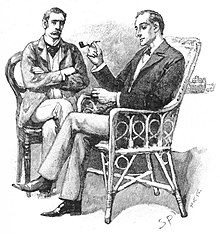Mr. Crammond's paper was titled 'Can we trust the Canon?' Of course it was done as Playing the Game.
While his paper is not the discussion here, someone falling the meeting on Facebook stated that 'he' never trusted Watson. His statement was, "John, I've always been of the opinion that you cannot trust Watson. However, I've never really considered it when it comes to The Canon itself."
To me that statement doesn't seem possible how can you, One; not trust Watson. Two; if you don't or do, how can you have either without the context of the Canon.
We went back and forth a little on this without him really backing up his comment, but in the end he suggested that a back and forth reply on Facebook was not the venue he wanted to explore the topic.
I look forward to him following it up somewhere else.
What are your thoughts? Do you 'trust' Watson?
I will fill in my thoughts latter in the day.
Let me know yours.

One has to consider what type of writer Watson was and what was his target audience. He was not in the strict sense an historian or a reporter. If we consider STUD alone, we might say he was a memoirist and his audience was not set as he submitted STUD to various publishers and ended up accepting Beeton's rather paltry offer when none others were forthcoming. From SIGN, published in Lippincott's Magazine and the short stories in the Strand, we might consider him a popular author writing "non-fiction novels'" that is as defined by wikipeadia "broadly speaking, depicts real historical figures and actual events woven together with fictitious conversations and uses the storytelling techniques of fiction. The non-fiction novel is an otherwise loosely defined and flexible genre." The medium of the popular magazine--which in the Strand's case published both fiction and non-fiction articles--Watson had to adapt the facts and incidents of Holmes' cases to the medium he was offering it to. Holmes, in COPP, accuses Watson of embellishment: "You have degraded what should have been a course of lectures into a series of tales." It is within that framework that Watson's trustworthiness should be judged, while also factoring in the literary agent's further editing of Watson's product for sale. The result is that one reader may take one tale or passage or presented fact as gospel while another may see literary license. Backing up one's point of view with citations of other points from the Canon, or other contemporary accounts, or history is how the Game is played.
ReplyDeleteWell said. It is unfortunate the the person who got me thinking on this topic did not chose to continue the discussion and I don't know if he will. I am looking forward to possible further debate.
Delete